
The Ultimate Overland Compressor? Here is Everything To Know About the 12v Smittybilt 2781 5.65 CFM Air Compressor – Full Review & Overview
Everything you need to know about the Smittybilt off-road air compressor (60% Duty Cycle – 40min on 20min off)
Having a universal air compressor to air up your tires at the end of the day is pretty nice. After a long day on the trail, you have a couple of options for airing up your tires.
You can drive to the local gas station and drop a few bucks on the air compressor or borrow your buddy’s compressor. Although California offers free air and water now, some gas stations still make you pay for it and hopefully, your buddy won’t charge you.
Airing up Challenges
Airing up at the gas station can be a pain sometimes, especially if they’re a few people in line, waiting for the air or water. Waiting to get compressor coins, waiting for people to finish with the compressor or rolling up to a gas station with a broken air compressor are all things that really bug me. I have run into these situations a few times, so I decided to grab a 12v Smittybilt 5.65 CFM Air Compressor.
I had plenty of choices out there to choose from, though.
A few choices to consider
My first choice was the 6.16CFM dual ARB air compressor, but sitting at almost $550, it is a bit pricey for an off-road compressor compared the other options below at less than $200.
It really depends on how much you wheel and if you can justify the cost, but god damn, the dual ARB is a nice compressor. The 6.16CFM ARB compressor is the highest CFM-rated air compressor among all 12V compressors.
Owners usually mount the 6.16CFM dual ARB air compressor as an onboard air/ permanent solution. Good news for the Smittybilt 2781, it can be run as an onboard air solution as well. If you are looking for an affordable onboard air/ permanent solution, the Smittybilt 2781 will also work for you.
At the end of the day, I compared the following affordable options. I was deciding between the VIAIR 300P, VIAIR 400P, the ARB (CKMP12), and the Smittybilt 5.65 CFM Air Compressor.
I started by looking at the CFM (cubic feet per minute)
CFM is basically how much air the fan in the compressor can move. Most compressors are rated by the CFM which is the volume of air a compressor can deliver at specific PSI levels.
- VIAIR 300P: 2.4CFM at 0 PSI – Check Price
- VIAIR 400P: 2.54CFM at 0 PSI – Check Price
- ARB (CKMP12): 2.65 CFM at 0 PSI – Check Price
- Smittybilt 2781: 5.65 CFM at 0 PSI (Amazon) – Check Price
- Smittybilt 2781: 5.65 CFM at 0 PSI (4WheelParts) – Check Price
All of these kits include a compressor, plenty of air hose, battery clips for power, a case, and all the necessary fittings to inflate tires as well as the miscellaneous camping gear.
The ARB (CKMP12) is the only air compressor that does not come with a pressure gauge. But, ARB is the only compressor that comes with a durable hard carry case. This is a cool feature of the portable ARB compressor but you can easily buy a hard case for any of the other compressors.
Both the VIAIR compressors and the Smittybilt compressor come with basic carrying bags. The VIAIR 400p is the only one in this lineup that has an air gun with a trigger (you just turn the other ones on).
VIAIR 300P Vs. VIAIR 400P Vs. ARB Vs. Smittybilt

Below are some of the key features of each compressor that went into the decision to buy the Smittybilt 2781. One of the most important features would be CFM and then we look at the duty cycle.
The duty cycle is the length of time an air compressor can be operated in a one hour period. The Smittybilt has the best duty cycle of them all. The VIAIR duty cycle is pretty weak on these models but it really depends on your budget.
VIAIR 300P: 2.4CFM at 0 PSI
- Maximum continuous cycle time (25% duty cycle) – 10 minutes at 100 psi at 72 degrees Fahrenheit (Run for 10min, and let it sit for 30min).
- (LPM) Liters per minute: 67.9
- Max Current Draw under load: 28 Amps
- Size (inches): 9.80L x 4.90W x 7.50H
- Built-in Pressure Off Switch
- Weight: 15 lbs
- 1-year warranty
VIAIR 400P: 2.54CFM at 0 PSI
- Maximum continuous cycle time (25% duty cycle) – 10 minutes at 100 psi at 72 degrees Fahrenheit (Run for 10min, and let it sit for 30min).
- (LPM) Liters per minute: 71.9
- Max Current Draw under load: 30 Amps
- Size (inches): 11.25L x 4.00W x 7.00H
- Built-in Pressure Off Switch
- Weight: 15 lbs
- 1-year warranty
ARB (CKMP12): 2.65 CFM at 0 PSI
- Maximum continuous cycle time (50% duty cycle) – 30 minutes at 29 psi at 72 degrees Fahrenheit (Run for 30min, and let it sit for 30min).
- (LPM) Liters per minute: 87.2
- Max Current Draw under load: 32 Amps
- Size (inches): 8.5W x 9.7H x 17.5L
- Pressure Cutout Switch
- Weight: 14.5lbs
- 2-year warranty
Smittybilt 2781: 5.65 CFM at 0 PSI
- Maximum continuous cycle time (60% duty cycle) – 40 minutes at 40 psi at 75 degrees Fahrenheit (Run for 40min, and let it sit for 20min).
- (LPM) Liters per minute: 159.99
- Max Current Draw under load: 45 Amps
- Size (inches): 16.1L x 11.4H x 10.8W
- Auto-thermal cutoff switch
- Weight: 20lbs
- 1-year warranty
- Smittybilt 2781: 5.65 CFM at 0 PSI (Amazon) – Check Price
- Smittybilt 2781: 5.65 CFM at 0 PSI (4WheelParts) – Check Price
Smittybilt 2781 Off-Road Tire/ Universal Compressor Overview

The Smittybilt 2781 is a much better Off-Road tire air compressor than the smaller model; the Smittybilt 2780. Smittybilt 2780 is rated at 2.54 CFM while the Smittybilt 2781 is rated at 5.65 CFM. If you are looking for a solid off-road tire compressor, go with the Smittybilt 2781, which is the compressor we are talking about here.
This compressor ships easily ready to use out of the box. It comes with everything you need to throw in the back of your 4Runner and air up your tires at the end of the day. With this compressor, you can also air up most of your camping accessories.
But, this compressor does not have the CFM/LPM output to run air tools or re-bead a tire. If you are looking for something with a little more power, you may want to consider a CO2 system. With a CO2 system, you can fill tires ultra fast, run lockers, use your air tools and re-bead a tire, no problem.
In the box, you will get the compressor, a 24′ coil air hose (enough to run to both rear tires from the front without moving the compressor), 10′ power cables, 150PSI pressure gauge, and a few attachment accessories.
The compressor also features, an easy-twist screw-on brass inflator top, a cleanable air filter, anti-vibration rubber base, and the storage bag. You can use this as a portable compressor or an onboard air solution as it comes with an option to be hard-wired.
Proprietary Fittings

The only issue with the Smittybilt air compressor is the proprietary fittings. The male and female fittings all the way around this air compressor are equipped with Smittybilts fittings that are not compatible with common air fittings.
If you want to hook up a 4-way tire inflation/ deflation system or use an ARB tire inflator, or any other air accessory, you still can. Instead of using the proprietary fittings, you can just grab a set of standard air fittings from Harbor Freight, Amazon or even Home Depot and then swap them out.
Smittybilt Air Accessories

The kit comes with an inflation needle, and two additional rubber tips for airing up your miscellaneous camping gear and accessories. The sizes provided should be large enough to blow up a standard air mattress with a smaller inlet. If you have an air mattress with the 1/2″ or 1″ inlet, you will need a larger fitting.
Anti-vibration rubber feet – base
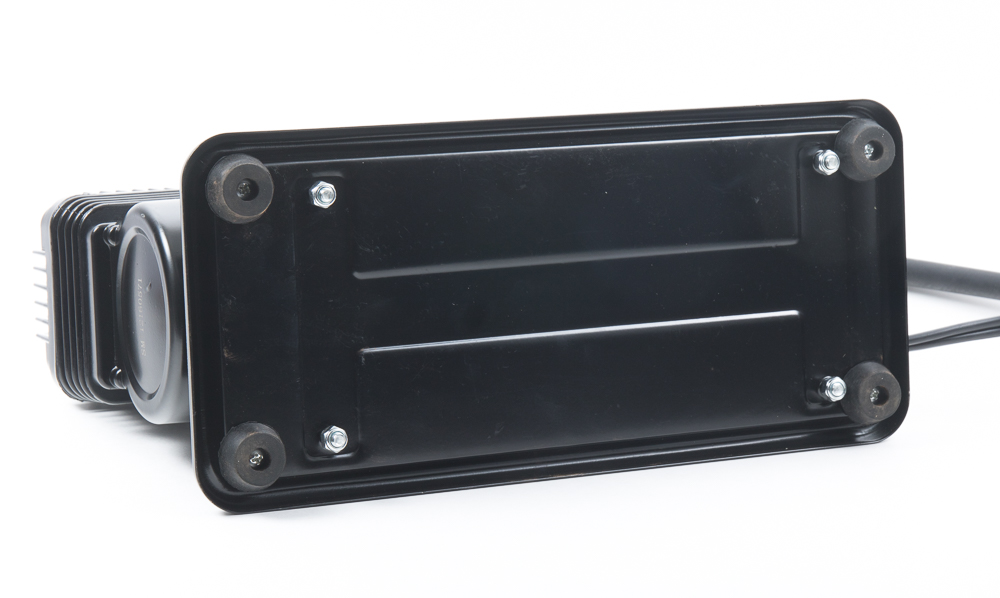
Some air compressors don’t come with an anti-vibration pad. When these air compressors are on, they will dig their way into the dirt, sand or gravel you place them on. Having a good anti-vibration pad on your compressor will alleviate some of the common headaches that come with cheaper compressors.
How to use the Smittybilt Compressor?
USE GLOVES – This compressor as with many 12v and 24v portable air compressors get extremely hot. The fittings will get incredibly hot, and they will burn your hand.
This is not a generic disclaimer, these compressors get VERY hot. You usually want to set your compressor at the front of your 4Runner, that way your 24′ air hose can reach back to the rear tires.
In another post, we will go over adding new fittings to this compressor. The compressor does perform quite well as is, it would just be nice to add an ARB inflator gauge inline.
Compressor to Air Hose
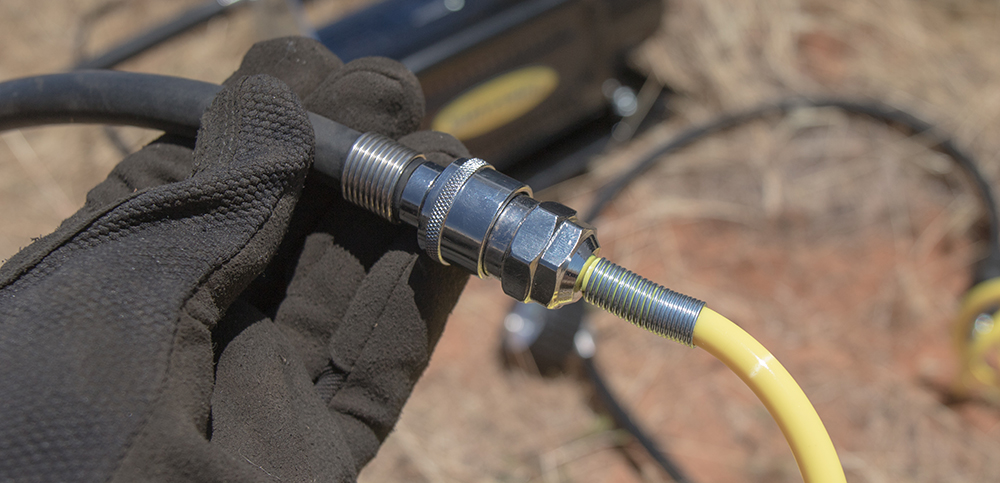
Air Hose to Pressure Gauge
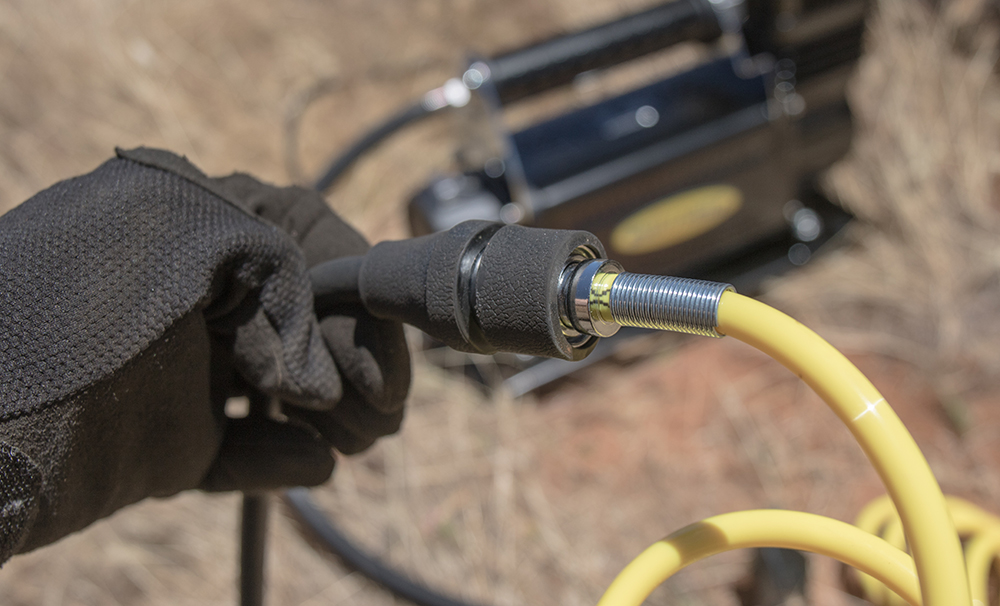
Battery Clamps to Battery Terminals
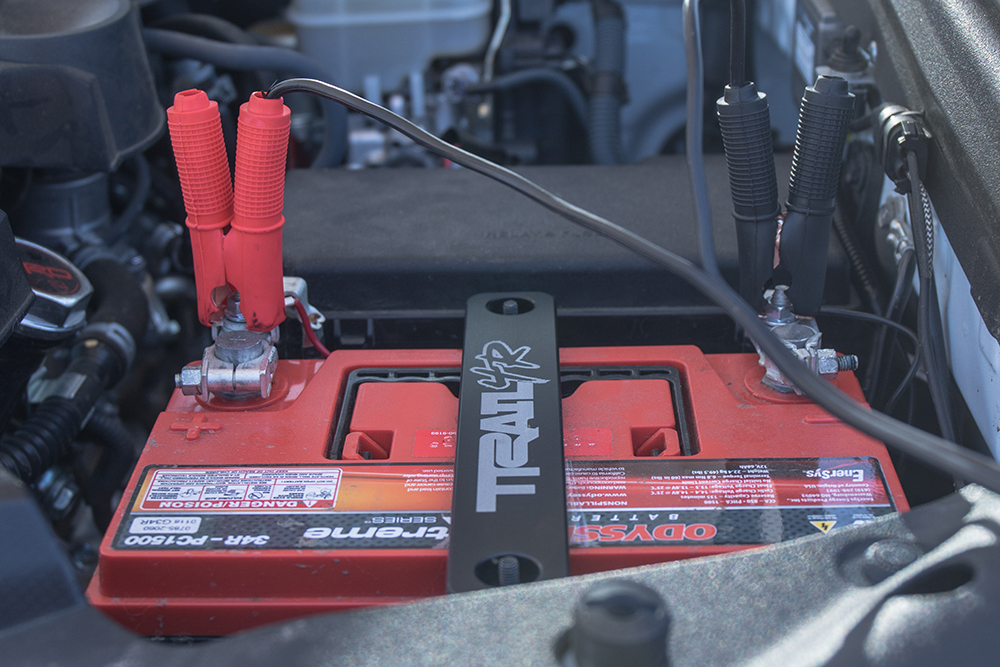
Compressor Inflator to tire (Pressure Gauage to Tire)

Typically, you want to place your air compressor at the front-end of your 4Runner, so you can leave it one place. From there, you can run your air hose to each tire without moving the compressor. For the sake of the post, I wanted to keep it all in one shot.
Turn on the Compressor

After your power is connected to your battery, and your pressure gauge is threaded onto your tire, you are ready to turn the compressor on.
Turn the compressor on and let it run for about 1-2 minutes depending on the size of your tire.
To get a reading on the pressure gauge, just shut off the Smittybilt and the pressure gauge will give you an accurate number (well close to accurate).
10PSI to 35PSI on a 35″ Tire?
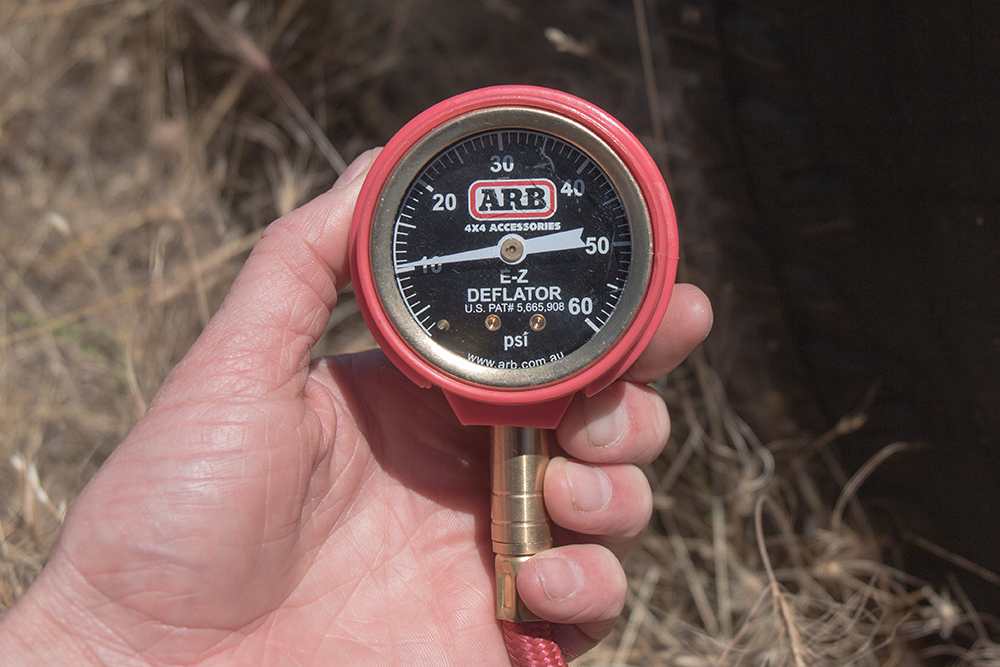
This compressor is rated to fill a 35″ tire from 10PSI to 35PSI in 2 minutes. I was impressed by hearing this initially because I have used other VIAIR compressors before and they took much longer (5 minutes+) to air up a 34″ tire to 35PSI from about 18PSI.
I aired down to 10PSI and tested on the 285/75R17 (33.8″) Toyos
10PSI after 2 minutes
After 2 minutes, I shut off the compressor and the Smittybilt gave me a reading of 39PSI. I checked with the ARB Deflator to double check and the ARB was showing 37PSI. It was was pretty damn close and it is possible that I lost a pound of air while threading off the Smittybilt.
10PSI after 1.30 minutes
After a minute and a half, I shut off the compressor and it showed 32PSI. Again, I double checked with the ARB Deflator and it displayed 30PSI. I will run a few more tests soon.
I am impressed with Smittybilt so far. This is a pretty fast little air compressor compared to the smaller Viair compressors.
So far, the product works as advertised with ft lb here or there. With the Smittybilt, you can’t complain about much other than the proprietary fittings.
Replacing the proprietary fittings

To make the Smittybilt a little more universal, I replaced all the fitting with standard air fittings. Now that the standard fittings are on, we can use the ARB inflator with our MORRflate 4-way tire deflation/inflation system and it also makes it easier to use on other applications.
Grab the following to replace the fittings
- (4) 1/4″ barb – male fitting: Check Price
- Air fitting coupler kit: Check Price

I purchased a 2781 and it functioned “OK” under light use until its warrantee expired, and then when powered up it just sits there and exhibits random spasmatic fits without producing any air. I would definitely NOT recommend this compressor for use out in the boonies due to its lack of reliability.
not fair to compare the 2781 against the little competition units, you should have used the #2780 from SMittybilt
Any advice on converting this to a cigarette lighter plug or hardwiring it? I want to keep it under the back seat of my tundra. Thanks for the help!
You cannot compare the duty cycles at drastically different PSI. The Viair’s at 100 psi are working much harder than the 40psi you noted on the 2781.
I totally agree. You can’t directly compare the Viair’s duty cycle against the duty cycle on the Smittybilt 2781 as they are both rated (as well are the others) for different run times and cycles. These companies, unfortunately don’t all provide the same exact duty cycles running a set psi. Although there are a ton of “standards” in the compressed air industry, there is not an official “standard” for the duty cycle of a compressor which for some, may cause confusion. We try to always share what the manufacture rates their equipment for so that you/and I can make an educated decision on what might be the best option to run based on exact psi needs and runtimes. Viair 400p is a great compressor and works well for airing up tires around a 33″-35″ but with a 35″ tire it tends to get really hot at the 30-36psi range.
Brenan,
I just got the Smittybilt air compressor model # 2718 am looking forward to using it while out wheeling with my
FJ Cruiser. You review of the 2781 was very good and detailed but, after reading the user’s manual and reading other reviews, I still cannot find out how to change the air filter.The manual states the air filter needs to be cleaned and washed periodically with soap and warm water.It also states, the air filter for the model# 2781 is under the chrome cap. It does not explain how to remove the chrome cap. I tried lifting it off, unscrewing it but, there is nothing to grip onto and I am afraid if I pull or twist too hard it will break. I love Smittybilt products but it is hard to believe that they sell an air compressor but fail to explain how to remove, check, clean and/or replace it. I have looked everywhere on the internet and the owners manual is just a very minimum very basic information. If you or anybody else on this board has the information to replace the air cleaner I would be very grateful.
Thanks in advance, Kevin
ok is this dumb or just me. you have to turn the compressor off to get a psi reading? the gauge is at the end of the hose screwed onto the tire. so you have to go from the tire, back up to the compressor, turn it off, walk back to the tire, look at the gauge, then walk back to the compressor to turn it on again…
No, you don’t need to shut it off, there is a quick pressure release on the back of the pressure gauge if you want to release air and check the PSI. While you are filling a tire or whatever else, your gauge will display the PSI in real-time but will lag a bit. To get a more accurate reading, the instructions say to shut off the compressor to get an accurate reading. Whether you are using the provided gauge or something like an ARB, you can check the PSI while the compressor is running.
So.i switched out the connectors to standard 1/4″ connectors and the pressure switch keeps popping. Is that normal? I would imagine it can shorten the life of the pressure switch. Incidentally i switched back to the open style connectors for now.
How will this do to fill my Monroe air schocks. I need to bring them up to 140 -150 psi when the weight of my 25’camper is connected to the trailer
I would go with the ARB twin for something like that but this Smittybilt 5.65cfm should work, it may take a little longer but it will get the job done.
Great info!! Thank you!!
They had a reason to go to the Japanese style JIS fittings, that is to discourage the installation of a closed style chuck. this compressor does not have a pressure switch and will over heat if you rely on the safety valve to blow off when you are using a closed chuck. I have mine hooked up to a 2.5 gallon tank and running a pressure switch. 90/120. it does ok but i know this compressor isnt really built for the high demands of tank filling, but it does fill the tank to 120 in about a minute. It’s happies when just filling low pressure tires.
Is it easy to get at the switch on this compressor to install the pressure switch from the tank? I’m looking at installing this in my ram for airing back up as well as for my airbags
I certainly like this compressor. It has been a champ and I haven’t noticed a need for glove use on the fittings but avoid the compressor heat fins but then I have smaller tires and likely not using as long. Only concern has been the air pressure gauge lately can leak at times. I found your review to be very consistent with my experience. thank you
Looks like it was the way the Google search results came up too.
Great post and review! You definitely talked me out the more expensive ARB.
In doing some more research the one you review is $93 approximately and a very similar model with the same model number 2781 for $165 approximately.
What I noticed is the one you review, for $93, is 72 LPM and the $165 is 160 LPM. LPM meaning liters per minute. Is this the rate at which is can fill a tire?
What’s your interpretation on LPM?
Wes, we reviewed the Smittybilt 2781 for $165 and mentioned the little brother (Smittybilt 2780) for $93. CFM (Cubic Feet per Minute) and LPM (Liters per Minute) are air/gas volume measurements used to measure flow over time. Some manufacturers measure airflow by CFM and some by LPM, but it is not often when they measure by both. They are just different ways to measure the volume of air over a certain amount of time.
For example, you have CFM (Cubic Feet per Minute) where Cubic Feet is the unit of air and Minutes is the unit of time. 1 cubic foot is equal to 28.317 Liters. So 1 cubic foot per minute is equal to 28.31 (LPM) Liters Per Minute, and vise versa. The LPM measurement of 28.31 is the equal flow rate of 1 cubic foot per minute but just used as LPM instead of CFM. In this case, LPM is the alternative to CFM and CFM is the alternative to LPM. At least, that is how it makes sense to me.
Smittybilt 2781 (5.6CFM)
Convert 5.65CFM to LPM
5.65 CFM X 28.31 LPM = 159.9
Smittybilt 2780 (2.54CFM)
Convert 2.54CFM to LPM
2.54 CFM X 28.31 LPM = 71.9
Most companies rate the volume of flow at 0PSI because this is where compressor generates most of its volume. But, as the pressure increases when filling your tire, the CFM/LPM will decline. We will probably never fill our tires from 0PSI, instead, we usually start filling our tires at 15-20PSI. The actual CFM/LPM may be substantially less at 15-20PSI and will continue to decline as more pressure goes into the tire.
Ty for the quick and very detailed response!
I see now that the 2780 I was looking at online did not have the model number in the description or on the site it was being sold on.
For $165, that’s still a great price though!
Thanks again for the deets!
Wes, no problem. I see how you may have been confused on the LPM, though. On Amazon, the 2780 and the 2781 have the same LPM of 72. This is correct for the 2780 but obviously, the 2781 sits higher at 160. Someone needs to send Smittybilt an email. I should probably get on that.